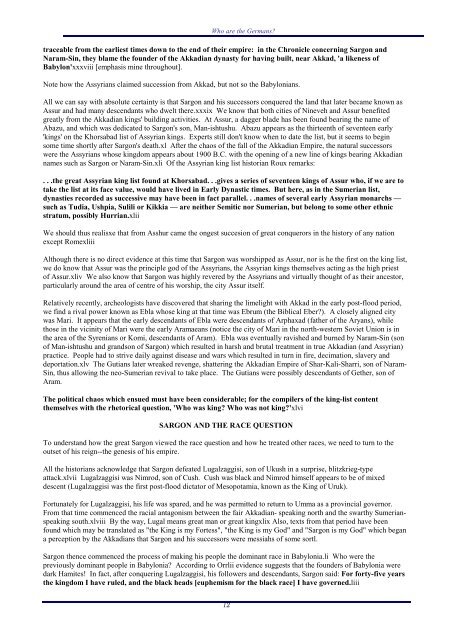WHO ARE THE GERMANS - Churches of God Cyber Auxiliary
WHO ARE THE GERMANS - Churches of God Cyber Auxiliary
WHO ARE THE GERMANS - Churches of God Cyber Auxiliary
Create successful ePaper yourself
Turn your PDF publications into a flip-book with our unique Google optimized e-Paper software.
Who are the Germans?<br />
traceable from the earliest times down to the end <strong>of</strong> their empire: in the Chronicle concerning Sargon and<br />
Naram-Sin, they blame the founder <strong>of</strong> the Akkadian dynasty for having built, near Akkad, 'a likeness <strong>of</strong><br />
Babylon'xxxviii [emphasis mine throughout].<br />
Note how the Assyrians claimed succession from Akkad, but not so the Babylonians.<br />
All we can say with absolute certainty is that Sargon and his successors conquered the land that later became known as<br />
Assur and had many descendants who dwelt there.xxxix We know that both cities <strong>of</strong> Nineveh and Assur benefited<br />
greatly from the Akkadian kings' building activities. At Assur, a dagger blade has been found bearing the name <strong>of</strong><br />
Abazu, and which was dedicated to Sargon's son, Man-ishtushu. Abazu appears as the thirteenth <strong>of</strong> seventeen early<br />
'kings' on the Khorsabad list <strong>of</strong> Assyrian kings. Experts still don't know when to date the list, but it seems to begin<br />
some time shortly after Sargon's death.xl After the chaos <strong>of</strong> the fall <strong>of</strong> the Akkadian Empire, the natural successors<br />
were the Assyrians whose kingdom appears about 1900 B.C. with the opening <strong>of</strong> a new line <strong>of</strong> kings bearing Akkadian<br />
names such as Sargon or Naram-Sin.xli Of the Assyrian king list historian Roux remarks:<br />
. . .the great Assyrian king list found at Khorsabad. . .gives a series <strong>of</strong> seventeen kings <strong>of</strong> Assur who, if we are to<br />
take the list at its face value, would have lived in Early Dynastic times. But here, as in the Sumerian list,<br />
dynasties recorded as successive may have been in fact parallel. . .names <strong>of</strong> several early Assyrian monarchs —<br />
such as Tudia, Ushpia, Sulili or Kikkia — are neither Semitic nor Sumerian, but belong to some other ethnic<br />
stratum, possibly Hurrian.xlii<br />
We should thus realisxe that from Asshur came the ongest succesion <strong>of</strong> great conquerors in the history <strong>of</strong> any nation<br />
except Romexliii<br />
Although there is no direct evidence at this time that Sargon was worshipped as Assur, nor is he the first on the king list,<br />
we do know that Assur was the principle god <strong>of</strong> the Assyrians, the Assyrian kings themselves acting as the high priest<br />
<strong>of</strong> Assur.xliv We also know that Sargon was highly revered by the Assyrians and virtually thought <strong>of</strong> as their ancestor,<br />
particularly around the area <strong>of</strong> centre <strong>of</strong> his worship, the city Assur itself.<br />
Relatively recently, archeologists have discovered that sharing the limelight with Akkad in the early post-flood period,<br />
we find a rival power known as Ebla whose king at that time was Ebrum (the Biblical Eber?). A closely aligned city<br />
was Mari. It appears that the early descendants <strong>of</strong> Ebla were descendants <strong>of</strong> Arphaxad (father <strong>of</strong> the Aryans), while<br />
those in the vicinity <strong>of</strong> Mari were the early Aramaeans (notice the city <strong>of</strong> Mari in the north-western Soviet Union is in<br />
the area <strong>of</strong> the Syrenians or Komi, descendants <strong>of</strong> Aram). Ebla was eventually ravished and burned by Naram-Sin (son<br />
<strong>of</strong> Man-ishtushu and grandson <strong>of</strong> Sargon) which resulted in harsh and brutal treatment in true Akkadian (and Assyrian)<br />
practice. People had to strive daily against disease and wars which resulted in turn in fire, decimation, slavery and<br />
deportation.xlv The Gutians later wreaked revenge, shattering the Akkadian Empire <strong>of</strong> Shar-Kali-Sharri, son <strong>of</strong> Naram-<br />
Sin, thus allowing the neo-Sumerian revival to take place. The Gutians were possibly descendants <strong>of</strong> Gether, son <strong>of</strong><br />
Aram.<br />
The political chaos which ensued must have been considerable; for the compilers <strong>of</strong> the king-list content<br />
themselves with the rhetorical question, 'Who was king? Who was not king?'xlvi<br />
SARGON AND <strong>THE</strong> RACE QUESTION<br />
To understand how the great Sargon viewed the race question and how he treated other races, we need to turn to the<br />
outset <strong>of</strong> his reign--the genesis <strong>of</strong> his empire.<br />
All the historians acknowledge that Sargon defeated Lugalzaggisi, son <strong>of</strong> Ukush in a surprise, blitzkrieg-type<br />
attack.xlvii Lugalzaggisi was Nimrod, son <strong>of</strong> Cush. Cush was black and Nimrod himself appears to be <strong>of</strong> mixed<br />
descent (Lugalzaggisi was the first post-flood dictator <strong>of</strong> Mesopotamia, known as the King <strong>of</strong> Uruk).<br />
Fortunately for Lugalzaggisi, his life was spared, and he was permitted to return to Umma as a provincial governor.<br />
From that time commenced the racial antagonism between the fair Akkadian- speaking north and the swarthy Sumerianspeaking<br />
south.xlviii By the way, Lugal means great man or great kingxlix Also, texts from that period have been<br />
found which may be translated as "the King is my Fortess", "the King is my <strong>God</strong>" and "Sargon is my <strong>God</strong>" which began<br />
a perception by the Akkadians that Sargon and his successors were messiahs <strong>of</strong> some sortl.<br />
Sargon thence commenced the process <strong>of</strong> making his people the dominant race in Babylonia.li Who were the<br />
previously dominant people in Babylonia? According to Orrlii evidence suggests that the founders <strong>of</strong> Babylonia were<br />
dark Hamites! In fact, after conquering Lugalzaggisi, his followers and descendants, Sargon said: For forty-five years<br />
the kingdom I have ruled, and the black heads [euphemism for the black race] I have governed.liii<br />
12


